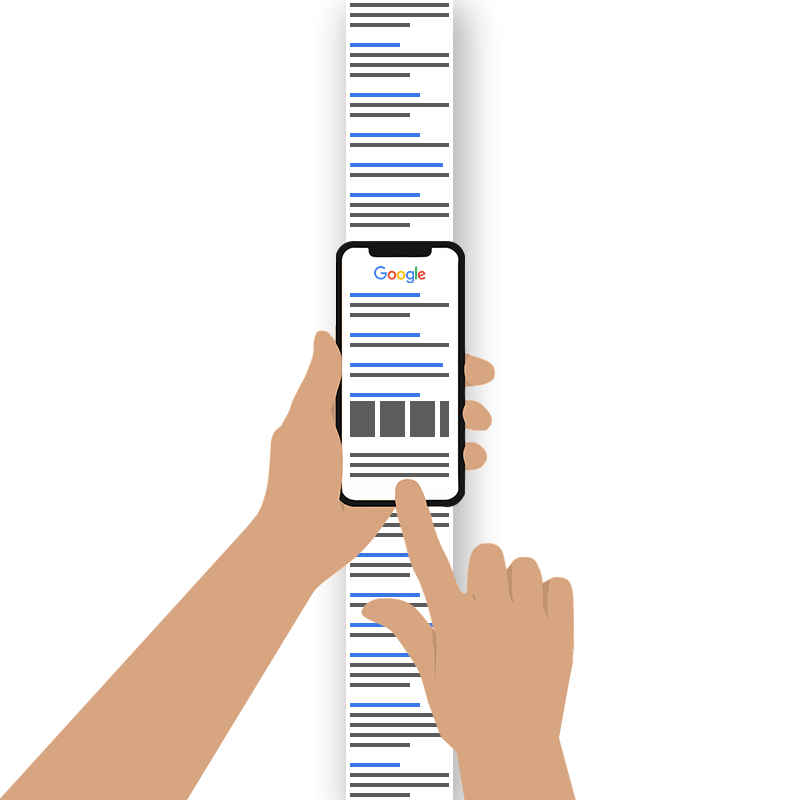
The word "google" can either mean Google the company, a verb referring the act of using Google, or a term to describe search engines in general.
Google has become so large and so ubiquitous that its search engine is the home page of almost every single browsers in this world.
And knowing that the search engine is the most visited place on the web, Google is continuously improving user experience.
That, in order to make improvements in engagements, clickthrough-rate and conversions. This is because Google's business model is reliant on this.
And this time, Google is rolling out a big update: endless scrolling, or also known as "infinite scrolling", or according to Google, it is called "continuous scrolling."
Previously, users have to tap on the 'See more' to load the next page after the usual 10 links of search results. with continuous scroll, Google will automatically load the next page, as soon as user hit the bottom of the page.
The company hopes that using this continuous scrolling feature, users will look to more search results, and that a longer supply of results is better for more open-ended search questions.
Beginning today, continuous scrolling is starting to roll out to Google Search for most English searches on mobile devices in the US. Learn more: https://t.co/ulPL0EaKV0 pic.twitter.com/W0iwL3fdy6
— Google SearchLiaison (@searchliaison) October 14, 2021
In a blog post announcing the feature, Google said that:
"Today, we’re making browsing search results more seamless and intuitive with the introduction of continuous scrolling on mobile devices."
"Now, when you reach the bottom of a search results page on your phone, the next set of results will automatically load with relevant information."
While Google is doing its very best to surface the most relevant information higher up on its search result, sometimes, people just want to scroll down for more.
"Sometimes you want to keep looking," said Google.
This way, people who wish to venture for more can "seamlessly" see more results pages without having to tap on anything.
In an example, Google said that users who searched for more open-ended questions like “What can I do with pumpkins?” may want to consider more results and inspiration before deciding how to move forward.
"Scrolling through a wider range of results may show you tons of options you hadn’t considered, like no-carve pumpkin decor ideas for Halloween, pumpkin seed recipes that make your pumpkin worth carving and more ideas for how to make the most out of your gourd," said Google.
Initially, the feature is rolling out to most English searches on mobile in the U.S. on both Android and iOS.
Infinite scrolling is a feature first popularized through social media networks, where content will load endlessly as users scroll down the page, eliminating the needs for having pagination or a load more button.
Social media apps succeed in using infinite scrolling because the feature plays with users' minds.
Infinite scrolling essentially tricks users into seeing more and more, motivating them to scroll down due to the easiness of seeing more and more information. As a result, users will quickly drown in an information abyss with no end in sight.
The success of infinite scrolling on social media sites such as Facebook, Instagram and Twitter have made this technique extremely popular.
But for Google, the search engine is not calling the feature "infinite scrolling" because its scroll does not infinitely scroll.
With "continuous scrolling", Google will automatically load search results pages until at least the fourth page, before finally showing the 'See more' button.
Google knows that infinite scrolling is advantageous for apps and services that have contents that streams constantly and has a relatively flat structure. But infinite scrolling is only beneficial if each unit of content belongs at the same level of hierarchy and has similar chances of being interesting to users.
Google has algorithms that surface the most relevant information higher on top. On the background, webmasters and website owners pay Google to be on top, or leverage in various SEO strategies to gain Google's trust and win their way up organically.
Infinite scroll on Google Search can kill these.
Google knows that if the search result is loading pages indefinitely, people may feel paralyzed by the sheer volume of content and the number of choices, and may not tap on anything. People may view results pages and the ads, but may not act as often. As a result, impression may be high, but engagement and clickthrough-rate will be lower.
As oppose to social media networks, infinite scroll may be the opposite of what Google wants.